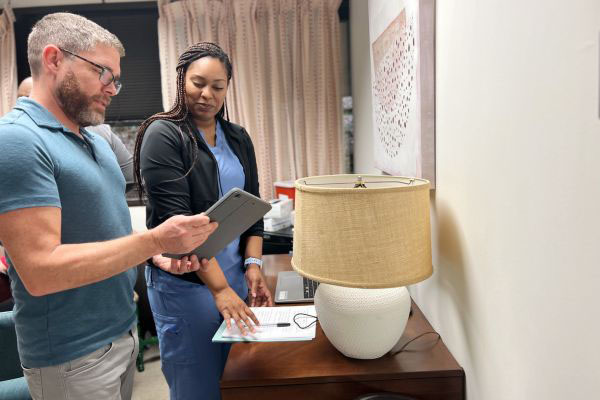Morning sickness can be one of the most challenging aspects of pregnancy. Most pregnant women experience at least some form of nausea during pregnancy, according to the National Library of Medicine, and one-third will experience vomiting. Some cases— less than 3 percent— develop hyperemesis gravidarum, a severe form of nausea and vomiting. Many of those women end up in the ER, but often without the care they really need. Dr. Andrew Housholder is out to change that.
While working as an ER doctor, Dr. Housholder would see a couple patients a month with hyperemesis gravidarum. He would also see that they weren’t receiving the proper treatment. Morning sickness is often looked at as something that women should suffer through. A doctor gives them medication as more of a bandaid than a cure. Dr. Housholder saw the distress that these patients experienced, waiting until they were incredibly ill to come into the emergency department and get fluids. After they were released from the ER, there were no other options except to go back to the ER again in a week when their symptoms got severe.

But Dr. Housholder knew that more could be done. He ruminated over the idea of giving pregnant patients suffering with severe nausea and vomiting early access to quality care. Working with his wife Kelly, the idea of opening a morning sickness clinic came to fruition.
“Currently, the societal norm is pregnant folks must suffer through morning sickness,” says Kelly Housholder. “The reality is that there is a lot that can be done for patients with moderate to severe morning sickness with IV infusion therapy, but most pregnancy care clinics aren’t set up for IV infusions. But IV fluids and medications are sometimes the only way to keep patients hydrated and feeling well enough to continue working and taking care of their families.”
Until the Morning Sickness Clinic opened in Birmingham in October, there was no physician or practice in the U.S. dedicated to treating nausea and vomiting from pregnancy (NVP). Patients often saw their pregnancy healthcare providers for their symptoms, but those practices don’t have the resources to treat patients as aggressively as is needed. Early treatment of NVP can also prevent patients from developing full-blown hyperemesis gravidarum.
“You actually don’t have to be throwing up to be completely dehydrated from nausea,” Kelly says. “If your symptoms are keeping you from eating and drinking normally and keeping down your prenatals, you might be at risk for dehydration.”
Patients with hyperemesis gravidarum often lose more than 5 percent of their weight during pregnancy due to vomiting, and they are often unable to work or help take care of their family due to their extreme illness. Though an estimated 3 percent of pregnancies suffer from hyperemesis gravidarum, it’s likely that number is severely underestimated, according to the HER Foundation, a national nonprofit focused on research and education for hyperemesis gravidarum.

“In the first month that our clinic was open, we estimate that over half our patients who have HG were undiagnosed, supporting the supposition that the percentage is well over 3 percent,” Kelly says.
With his clinic, Dr. Housholder aims to take a holistic look at the woman’s condition. He typically spends 45 minutes to an hour discussing the patient’s symptoms and treatment plan. The clinic offers a comfortable setting, bedside electrolyte machines, IV therapy and blood tests. Dr. Housholder can prescribe medications to ease nausea and vomiting. And the best part: women can schedule appointments directly online at a time that works for them. The clinic also offers iron infusions for anemic pregnancies and IV fluids to breastfeeding mothers who are struggling with milk production (where dehydration might be the culprit).

Since many women with hyperemesis gravidarum need careful monitoring, Dr. Housholder also developed an app that he can use to track a woman’s symptoms to adjust their treatment as needed. The Housholders are also working with HER Foundation to help further their research into causes as well as the most effective treatments for pregnancy-related illnesses. In the clinic, they follow HER foundation treatment protocols for hyperemesis gravidarum.
When it comes to the cost for care, it just didn’t sit right with Dr. Housholder that it would be a cash pay clinic. So, he worked with insurance company requirements (including Medicaid) to lay down plans for a clinic that would allow services to be covered under insurance in the same way that primary care doctor’s visits are covered, rather than an emergency room bill. Access to care for everyone is a big part of his model.
Says Kelly: “It is our hope that this way of taking care of nausea and vomiting of pregnancy catches on throughout the country, changing the way pregnancy healthcare is viewed in the first trimester and beyond.”








